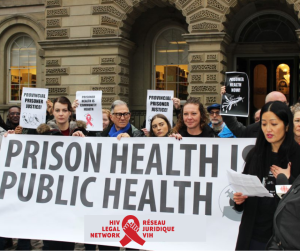 By Anne-Rachelle Boulanger and Holly Kohler
By Anne-Rachelle Boulanger and Holly Kohler
Suicides and overdoses were the two leading causes of death for people in Canadian prisons between January 2019 and February 2025. 72 percent of these non-natural deaths were of people serving determinate sentences — in other words, their release date was fixed and foreseeable. These figures, recently released by the CBC with data from Correctional Services Canada (CSC), do not tell a new story. Rather, they are part of a longstanding history of Canada failing to provide adequate healthcare to people in prison. Systemic failures and gaps in Canada’s prison system have long caused and continue to create alarming health outcomes.
In Canada, only six of fourteen prison jurisdictions require healthcare in prison to be delivered by the same ministry of health that provides healthcare to the broader population. In the remaining jurisdictions, healthcare is provided by the ministry responsible for corrections. This is but one of many systemic failures. Incarcerated people have a right to health and are entitled to healthcare that is at least equivalent to that which is available in the community. However, when prison healthcare is treated as its own ‘island,’ siloed off from the rest of Canada’s healthcare system, this standard is rarely realized in practice.
What happens to the health of people in prison when ministries of corrections — not health — are delivering healthcare? In Manitoba, only 4% of correctional officers feel able to recognize fentanyl use, overdose, or withdrawal, and only 8% feel comfortable using naloxone — a life-saving medication that temporarily reverses the effects of an opioid overdose. In Saskatchewan, nurses responsible for healthcare in the province’s prisons often do not receive any training when hired. In Ontario, a detained person at the Toronto South Detention Centre described his healthcare as inconsistent, lacking confidentiality, and noted that people were given “the wrong medication…every single day.” In short, when healthcare for prison populations is devalued and neglected, people in prison face dangerous health outcomes.
This model of prison health in Canada, which treats healthcare as “just one among many programs offered,” deprives incarcerated people of not only their right to health but also their human dignity. Further, inadequate access to effective healthcare causes emotional harm and stress, leaving people in prison without support in times when they most need it. The mental anguish of living without proper access to healthcare is often a driving force of suicides and overdoses.
We know why people are dying in Canada’s prisons. Why, then, do these harmful policies and practices persist? Part of this can be attributed to another systemic failure: the veil of secrecy that surrounds prison health indicators. For example, while CSC possesses information and data describing the health outcomes of people in its prisons, much of the cruelty is intentionally hidden. Recent figures about prison suicides and overdoses were only released after a freedom of information request. Troublingly, CSC later requested that this information be deleted. In essence, CSC knew the gravity of the figures its data package contained but wished to conceal it — indicative of the broader lack of transparency across Canada’s prisons. Without transparency, the Canadian prison system lacks accountability for providing essential healthcare services to incarcerated people, ultimately enabling harmful healthcare practices to persist.
Health improvements in prison are possible. For example, in 2021, Prisoners’ Legal Services (PLS) in British Columbia reached a settlement with CSC to improve its opioid agonist treatment (OAT) program by eliminating waitlists and other unnecessary barriers to treatment. In Alberta and Newfoundland, OAT teams in prisons are made up of healthcare providers specializing in OAT. In New Brunswick, a plan has been approved to make naloxone directly accessible to incarcerated people. Nonetheless, without integrated care, adequate healthcare treatment, and consistent transparency and accountability in Canada’s prison system, poor health outcomes will persist.
On the 50th anniversary of Prisoners’ Justice Day, it is critical to reflect on the failures of Canada’s prison system and to advocate for systemic change. People in prison are entitled to the same access to healthcare as those outside. Until this right is realized, our communities will continue to be plagued by tragic and preventable deaths among incarcerated people.
Anne-Rachelle Boulanger is a lawyer and policy analyst at the HIV Legal Network. Holly Kohler is a Joint Honours student in Political Science and Gender Studies at McGill University and a Research and Communications Intern at the HIV Legal Network.
